Middle East
I have finally understood the true meaning of Land Day | Israel-Palestine conflict

When I was a school student, every morning, we would gather in the schoolyard and sing songs dedicated to our land, Palestine. Many of our classes would teach us about our culture and traditions deeply rooted in Palestinian land.
Every March 30, we would mark Land Day. Girls would wear embroidered dresses and boys would wear white shirts and keffiyeh. We would sing under a raised Palestinian flag and commemorate the Palestinian land struggle.
I fully realised the true meaning of what I was taught about this struggle only when I faced displacement from my home, when I faced the very real possibility of losing my land.
I was born and raised in the Shujayea neighbourhood on the eastern flank of Gaza City. It is a centuries-old neighbourhood, where farmers and traders settled. Over time, it became one of Gaza’s most densely populated neighbourhoods, known for its strong community ties and history of resistance. It is no coincidence that one of its most prominent people was Dr Refaat Alareer, a poet, a scholar, and my professor in English, who inspired me to write and resist.
My family has lived in Shujayea for centuries. They built home after home in the same area until they created a long street known as Mushtaha Street. This is not just a name; it is a testament to just how deep our roots run in this land.
We not only have our homes in Shujayea but also our farmland. I grew up playing on my grandfather’s olive grove, which he had inherited from his ancestors. The olive trees taught us how to love our land, and how to be steadfast like them.
I have never thought, even for a minute, of leaving my home, my neighbourhood. As a child, I never dreamed of living elsewhere, I wanted to stay where my ancestors had happily lived, to inherit the land, to tend to the olive trees.
The first time we had to flee our Shujayea was when Israel attacked in 2014. I was very young at that time, but I remember every single moment of our evacuation. I remember the missiles and shrapnel flying around and the sound of the screaming and crying. It was a traumatic experience, but throughout it, I was sure that we would soon return.
Then, it happened again almost 10 years later. Throughout the genocide, my family and I had to flee our home more than 10 times. The longest we had to stay away from our neighbourhood was three months. But we never went too far. Despite the extremely difficult conditions, we did not flee to the south; we stayed in the north.
Shujayea endured two invasions during this war, the first in December 2023, and the second in June 2024. The second came suddenly, without warning, on a summer morning while residents were still in their homes.
When the Israeli tanks reached Shujayea, they targeted markets and old restaurants, electricity poles and water pumps, levelling many areas until they were unrecognisable. The once-busy streets turned grey with destruction.
My family home was bombed and partially destroyed. My grandfather’s land was not spared either. The trees that stood for generations, that gave fruit countless seasons, were uprooted and burned.
The loss of his olive grove proved too much for my grandfather. Within three months of hearing the devastating news, he passed away.
Today, we face the prospect of being displaced once again. People from the eastern part of Shujayea have started fleeing under threats from the Israeli army once again. We do not know what is going to happen next. People are afraid but are still hoping there will be another ceasefire.
This year, marking Land Day carries a different meaning: Despite the continuing genocidal war, we are still here, we are still standing, and we are still holding on to the land that we inherited from our ancestors. We will not give up.
On this day, I remember Dr Alareer’s poem:
O, Earth
Hug me
And hold me tight
Or devour me
To suffer no more.
I love thee
So take me.
Make me rich.
Make me dirt.
Gone are the days of serenity.
Guns are the words of humanity.
I have no food but a thorn,
No sport but a sigh.
For a soldier needs to feel high.
O, Earth,
If in life I am to hurt
Let my dirt in you give birth.
O, Earth.
The views expressed in this article are the author’s own and do not necessarily reflect Al Jazeera’s editorial stance.
Middle East
At least 38 killed, 102 injured in US air strikes on Yemen: Report | Houthis News
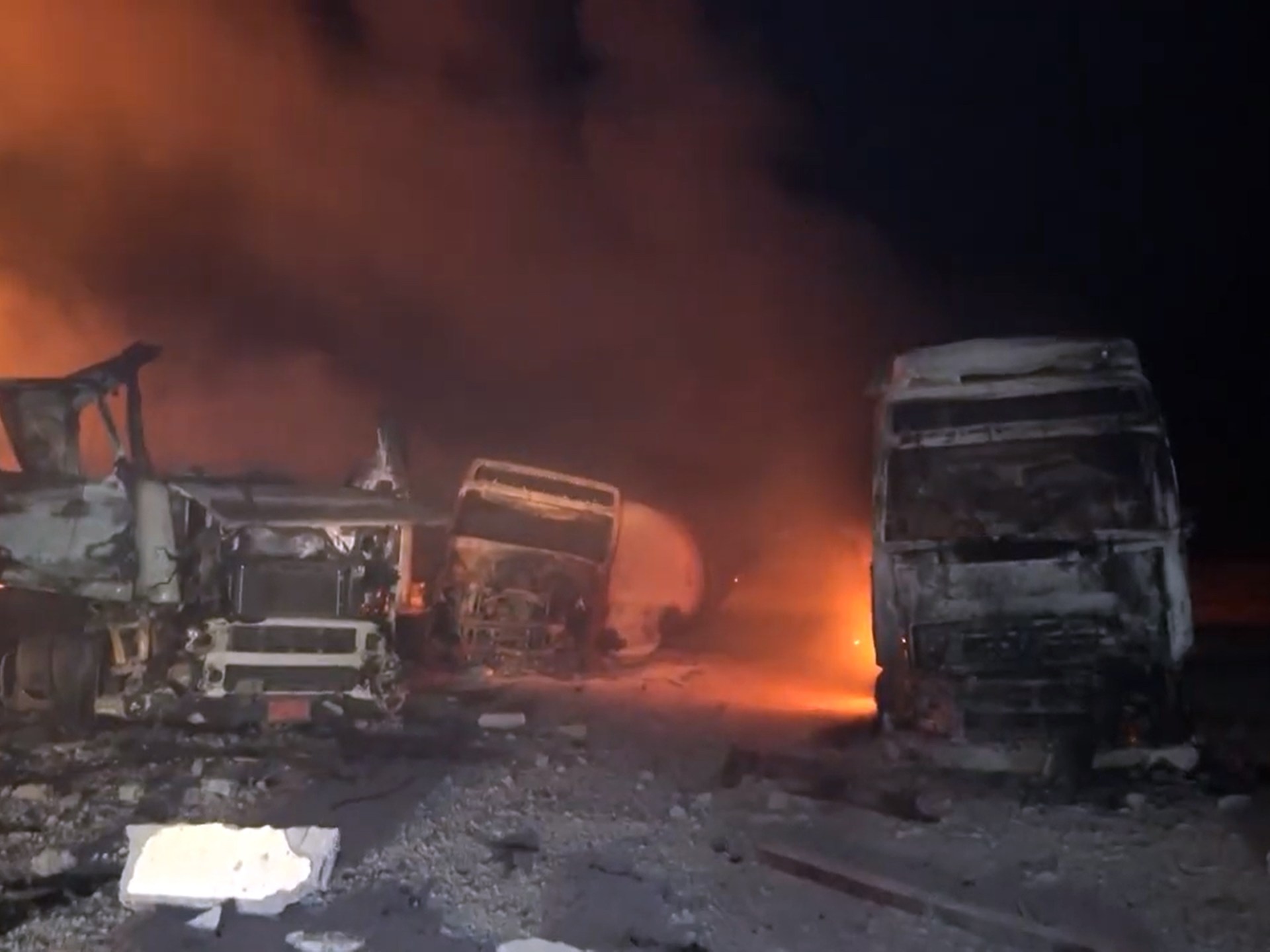
DEVELOPING STORYDEVELOPING STORY,
Reported death toll marks one of the deadliest attacks by the US military on Yemen.
Air strikes by the United States on Yemen’s Ras Isa oil port have killed at least 38 people in what is one of the deadliest attacks on the country by US forces, Houthi-affiliated media report.
Al Masirah TV said the strikes on Thursday also wounded 102 people, citing the country’s Hodeidah Health Office.
The US Central Command (CENTCOM) said that the airstrikes were intended to cut off funding and resources to the Houthis.
“The objective of these strikes was to degrade the economic source of power of the Houthis, who continue to exploit and bring great pain upon their fellow countrymen,” CENTCOM said in a post on social media.
The Pentagon did not immediately respond to a request for comment on the rising death toll.
Video footage shared by Al Masirah TV on social media in the early hours of Friday morning show massive explosions lighting up the night sky across a body of water identified as Ras Isa port. The video then jumps to close-up clips of rubble and fires before panning to a graphic image of a dead civilian.
“Initial footage of the US aggression’s crime targeting the Ras Isa oil port, resulting in a number of martyrs and dozens of port workers and employees being injured,” a caption attached to the post said in Arabic.
Other videos shared by Al Masirah TV on X show similar scenes of destruction and interviews with badly burned port workers.
The US attack marks one of the deadliest since the US launched air strikes against the Houthis in its biggest military operation in the Middle East since US President Donald Trump took office in January. In March, two days of US attacks killed more than 50 people, Houthi officials said
Ras Isa hosts an oil pipeline and port that are “critical and irreplaceable infrastructure” in Yemen, according to the United Nations Development Programme.
About 70 percent of Yemen’s imports and 80 percent of its humanitarian assistance passes through the ports of Ras Isa, Hodeidah and as-Salif.
An Al Masirah TV correspondent said that members of the civil defence force and the Yemeni Red Crescent had been dispatched to the scene to provide medical assistance and extinguish fires.
Houthi official Mohammed Nasser al-Atifi told the news outlet that the “American enemy’s crimes” will not deter the Yemeni people from supporting Gaza, but “rather will strengthen their steadfastness and resilience”.
Early on Friday and just hours after the devastating US attack, Israel’s military said that it had intercepted a missile launched from Yemen.
Since November 2023, the Houthis have reportedly launched more than 100 attacks on vessels they say are linked to Israel, a campaign they say is in response to Israel’s war on Gaza.
Washington has warned the Houthis that attacks will continue until the armed movement ceases attacks on shipping in the Red Sea.
Middle East
Saudi defence minister visits Tehran before Iran-US talks | United Nations News
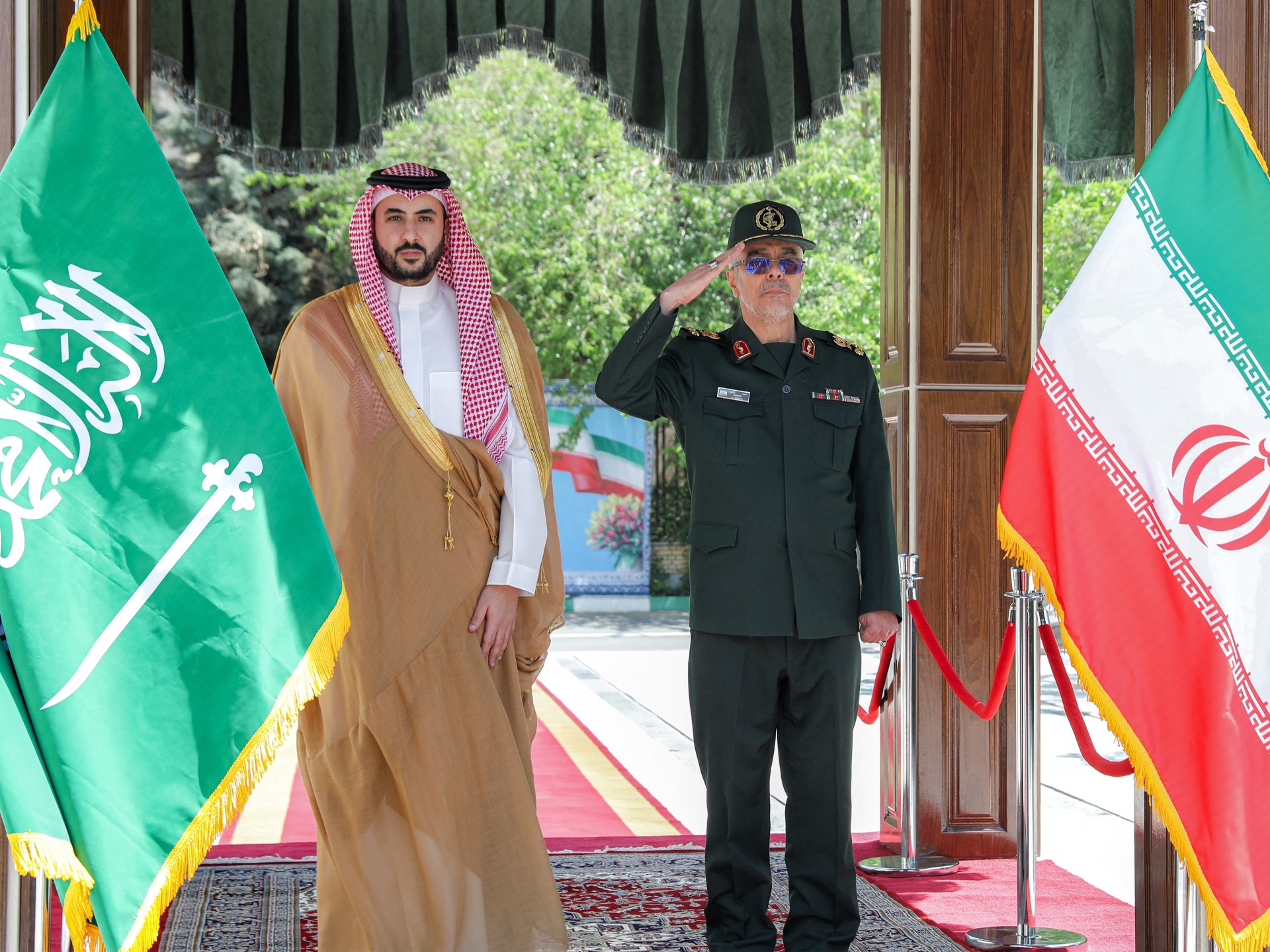
Saudi Arabia’s Defence Minister Prince Khalid bin Salman has met several Iranian officials before a second round of talks between Washington and Tehran over Iran’s nuclear programme.
The visit comes amid growing fears of a potential conflict in the region if diplomatic efforts fail to resolve soaring tensions between the United States and Iran, with President Donald Trump repeatedly threatening to bomb Iran if it does not reach an agreement with the US over its nuclear-related activities.
Prince Khalid said he conveyed a message from Saudi Arabia’s King Salman to Iranian Supreme Leader Ayatollah Ali Khamenei during Thursday’s meeting in Tehran.
“We discussed our bilateral relations and topics of mutual interest,” he wrote on X.
“Our belief is that the relationship between the Islamic Republic of Iran and Saudi Arabia is beneficial for both countries,” Iranian state media cited Khamenei as saying in the meeting on Thursday.
Prince Khalid also met President Masoud Pezeshkian and Iran’s armed forces chief of staff, Mohammad Bagheri.
“Ties between the Saudi and Iranian armed forces have been improving since the Beijing agreement,” Bagheri said after the meeting, according to Iranian state media.
Saudi Arabia has welcomed Iran’s nuclear talks with the US, saying it supported efforts to resolve regional and international disputes.
Hamidreza Gholamzadeh, a political analyst, said the purpose of the Saudi defence minister’s was likely to express concern about a potential attack on Iran.
“Saudis want to share their concern and reassure Iran that they would not like … attacks against Iran and they want better relations with Iran,” he told Al Jazeera.
Iran and Saudi Arabia agreed in a 2023 deal brokered by China to re-establish relations after years of hostility that had threatened stability and security in the Gulf region and helped fuel conflicts in the Middle East from Yemen to Syria.
‘Crucial stage’
The Saudi defence minister’s trip coincided with a visit to Iran by the UN nuclear watchdog chief, Rafael Grossi, who warned that the US and Iran were running out of time to reach a deal.
Iranian and US delegations are set to gather in Rome on Saturday for a second round of Omani-mediated negotiations, a week after the longtime foes held their highest-level talks since US President Donald Trump abandoned a landmark nuclear accord during his first term in 2018.
Since re-entering the White House in January, Trump has revived his so-called “maximum pressure” policy, imposing punishing economic sanctions against Iran and threatening military action if Tehran does not agree to a deal.
“We are in a very crucial stage of these important negotiations. We know we don’t have much time, this is why I am here … to facilitate this process,” Grossi said on Thursday.
“We are working hard and we want to succeed,” he told a joint news conference with Iran’s atomic energy agency chief Mohammad Eslami, acknowledging that the effort to secure a deal was “not an easy process”.
Asked about US President Donald Trump’s threats to attack Iran, Grossi urged people to “concentrate on our objective.”
“Once we get to our objective, all of these things will evaporate because there will be no reason for concern,” he said.
In March, Trump sent a letter to Iran’s Supreme Leader Ayatollah Ali Khamenei urging talks and warning of possible military action if Iran refused.
Khamenei has cautioned that while the talks with the United States had started well, they could yet prove fruitless.
“The negotiations may or may not yield results,” he said on Tuesday.
Western governments have long accused Iran of seeking to acquire nuclear weapons capability, an ambition Tehran has consistently denied.
Since the nuclear deal’s collapse in 2018, Iran has abandoned all limits on its programme, and enriches uranium to up to 60 percent purity, near weapons-grade levels of 90 percent.
Surveillance cameras installed by the IAEA have been disrupted, while Iran has barred some of the Vienna-based agency’s most experienced inspectors.
But despite the tensions between Iran and the agency, its access has not been entirely revoked.
Middle East
Russia’s Putin, Qatar’s emir discuss Syria and Gaza at Moscow talks | Syria’s War News
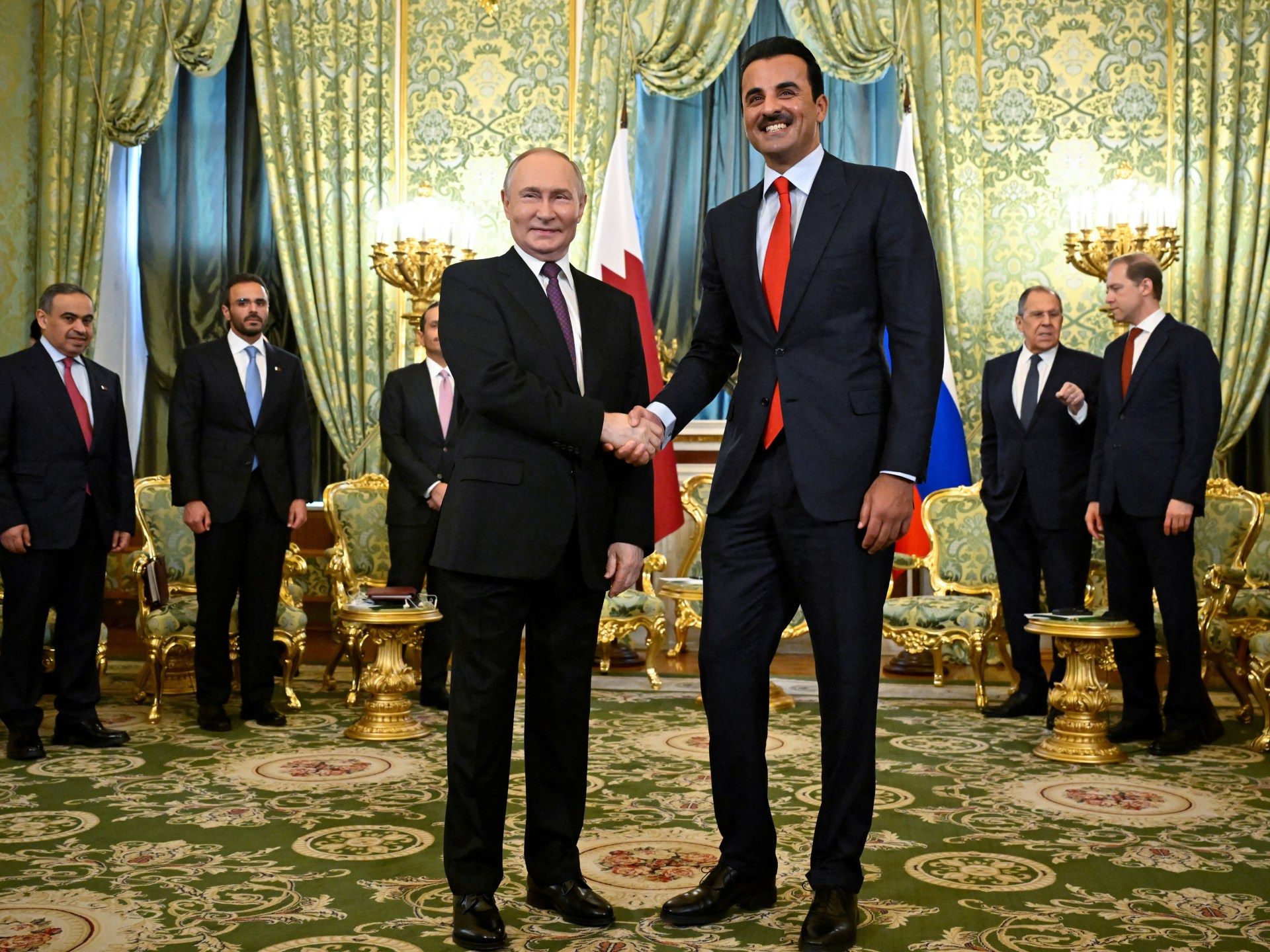
Ahmed al-Sharaa, Syria’s new leader, would like better relations with Moscow, Qatar said.
Qatar’s Emir Sheikh Tamim bin Hamad Al Thani has told Russian President Vladimir Putin that Syria’s new leader is keen to build ties with Moscow.
At talks in the Russian capital on Thursday, Al Thani assured the Russian leader that interim president Ahmed al-Sharaa was seeking to build relations with Russia, after the removal of former President Bashar al-Assad, who was a close ally of Moscow.
“As for Syria, a few days ago President al-Sharaa was in Qatar, and we spoke with him about the historical and strategic relationship between Syria and Russia,” Al Thani told Putin.
The talks come as Putin attempts to retain Russia’s use of two military bases in Syria to maintain its influence in the region after al-Assad fled the country in December as opposition fighters led by Ahmed al-Sharaa closed in on the capital.
Putin said Syria’s situation, rocked by sectarian violence in recent weeks, was of serious importance.
“We would like to do everything to ensure that Syria, firstly, remains a sovereign, independent and territorially integral state, and we would like to discuss with you the possibility of providing assistance to the Syrian people, including humanitarian assistance,” the Kremlin leader told the emir.
The two men also discussed the situation in Gaza, where Qatar played a key role in brokering a January ceasefire deal between Israel and Hamas for a three-phase ceasefire.
Israel restarted its offensive in the besieged enclave in March, and talks to try to restore the ceasefire have so far failed to achieve a breakthrough.
“We reached an agreement regarding Gaza a few months back, but Israel has not adhered to the agreement,” Al Thani said.
“Qatar, in its role as a mediator, will strive to bridge differing perspectives in an effort to reach an agreement to end the suffering of the Palestinian people.”
Putin told the emir, “We know that Qatar is making very serious efforts to resolve the Israeli-Palestinian conflict.
Unfortunately, the initiatives put forward, including by you, have not been implemented. Peaceful people continue to die in Palestine, which is an absolute tragedy of today.”
Interfax quoted Kremlin spokesperson Dmitry Peskov as saying there was no substantive discussion of the war in Ukraine, but Putin expressed thanks for Qatar’s involvement in arranging the return of children from both countries who were separated from their parents during the war.
-

 Europe2 days ago
Europe2 days agoCody Balmer, the suspect in arson at Pennsylvania governor’s home targeted the governor for his views on war in Gaza, warrant says
-
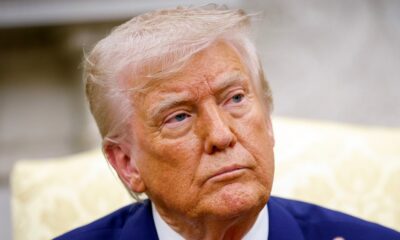
 Education2 days ago
Education2 days agoTrump administration revokes humanitarian parole of Spanish teacher
-
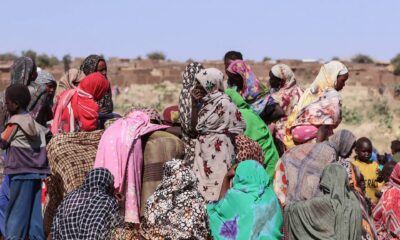
 Conflict Zones2 days ago
Conflict Zones2 days agoAfter two years of war in Sudan, the world can no longer plead ignorance | Conflict
-
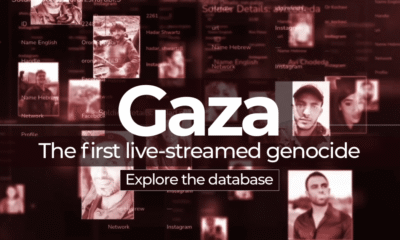
 Conflict Zones2 days ago
Conflict Zones2 days agoIsraeli soldiers filmed themselves destroying Gaza: See the video evidence | Israel-Palestine conflict News
-

 Sports2 days ago
Sports2 days agoNew Orleans Saints win lawsuit over fleur-de-lis trademark filed by ‘direct descendant of the Kings of France’
-
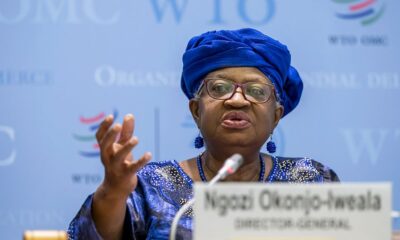
 Africa2 days ago
Africa2 days agoWorld Trade Organization says global trade could slide this year due to tariffs
-

 Conflict Zones16 hours ago
Conflict Zones16 hours agoHaiti in ‘free fall’ as violence escalates, rights group warns | Armed Groups News
-
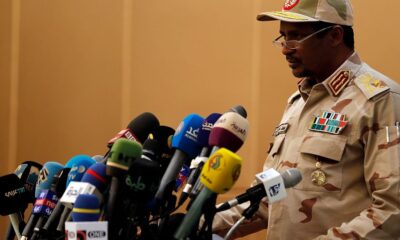
 Africa2 days ago
Africa2 days agoSudan: Rapid Support Forces leader announces rival government




